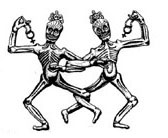
Homosexuality Is Bad? But Where’s That in the Lectionary?
WAS IT THE LAVENDER MAFIA?
No issue has been more intensely “in the face” of the Catholic Church in recent years than homosexuality. After breaking into the news big time early in 2002, the priestly sexual abuse scandal continues to make weekly headlines. “Gay marriage” is a controversial issue in several states and the courts. Catholics have been directed by their Church to stand firm against it, but if public opinion polls can be believed, many of the faithful don’t seem prepared to do so.
The well-organized and financed “gay” lobby — lavishly supported by Hollywood and the media — is continuously beaming its insidious message into the popular culture: Homosexual sex is normal, even good.
How should the individual Catholic respond to all this? He needs to become familiar with the teaching of his Church.
Our conscience, which aids us in discerning good and evil, plays a key role here. Catholics rely heavily on their conscience to guide them — to a fault. According to a 2005 CNN poll, 74 percent of Catholics said they would listen to their conscience rather than the teachings of the pope when making tough moral decisions.
You May Also Enjoy
Zondervan, publisher of the NIV, planned a so-called inclusive-language version of the NIV that would eventually replace it, but was pressured to stop.
The Cyrenian approach to debt relief is personal: he lends a debtor money out of his own pocket at an unbeatable interest rate — nothing.
'Queerness' is more than a broad aegis under which to group everything that is not heterosexual. There is a spirit that animates the LGBTQ worldview.

